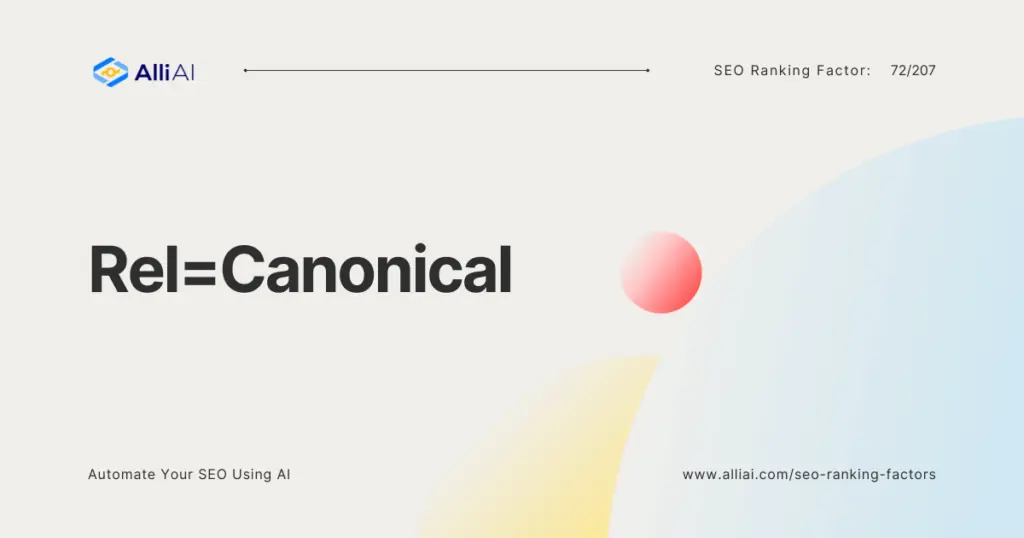Rel=Canonical: The Keystone of Managing Duplicate Content in SEO
Imagine you’re a librarian organizing books on shelves. You discover several copies of the same book scattered across the library. You decide to place a note on each copy directing readers to the shelf where the “main” copy, which you want people to read, is located. The `rel=canonical` tag does something similar on the web. It tells search engines like Google which version of a duplicated page is the “main” or preferred one. This helps prevent problems caused by duplicate content appearing on multiple URLs.
Why is Rel=Canonical Important in SEO?
In SEO, uniqueness is not just a virtue; it’s a necessity. Search engines strive to present the most relevant and unique content to users. When duplicate content exists, search engines can get confused about which version to index or rank for query results. This confusion can dilute link equity and diminish the visibility of your content on search engine results pages (SERPs). The canonical tag helps resolve these issues by guiding search engines to the original source, ensuring that your SEO efforts are concentrated on the page you deem most important.
How Rel=Canonical Affects SEO
Using `rel=canonical` effectively can significantly impact your SEO strategy in several ways:
– Prevents Content Duplication: It addresses the issues of duplicate content without physically removing or blocking any pages. This is especially useful for e-commerce sites where product pages might only differ by a query string.
– Aggregates Page Rankings: It helps to aggregate page rankings and link juice to one preferred URL, enhancing its ability to rank higher in SERPs.
– Improves Crawl Efficiency: By indicating the canonical page, you help search engines index your site more efficiently, conserving crawl budget for more unique and valuable content.
According to Moz, duplicate content can substantially affect your site’s SEO performance, diluting the authority of your site across multiple pages instead of consolidating it in one authoritative page. Implementing the correct canonical tags can mitigate these risks, as highlighted by studies indicating that websites consolidating their duplicate content achieved noticeable improvements in their organic visibility.
How Can Alli AI Help With Rel=Canonical?
At Alli AI, we understand the complexity and importance of correctly implementing `rel=canonical` tags. Our tool has been meticulously designed to help SEO professionals and website owners navigate these challenges effortlessly.
– Automated Canonical Tag Generation: We created Alli AI to automatically suggest the appropriate canonical tags for your web pages, reducing the risk of human error and saving you significant time and effort.
– Duplicate Content Identification: Our tool scans your website to identify duplicate content issues, making it easier for you to apply the necessary canonical tags where they’re needed most.
– SEO Strategy Optimization: By integrating rel=canonical recommendations into our comprehensive SEO strategy toolset, Alli AI ensures that your efforts are focused and effective, driving better results in SERPs.
– Continuous Monitoring and Updates: The digital world is always changing, and so are your website’s needs. Alli AI continuously monitors your site for new content and changes, offering updated recommendations to keep your site optimized for search engines at all times.
FAQ
How does rel=canonical differ from a 301 redirect?
Rel=canonical is used to indicate preferred versions of similar or duplicate content within your website without physically redirecting the visitor. A 301 redirect guides both users and search engines to a different URL than the one they initially requested, transferring the SEO equity to the new page.
Can rel=canonical tags be used across different domains?
Yes, cross-domain canonical tags are possible and useful in cases where the same content is published across multiple domains. This helps to consolidate SEO signals for a piece of content to the preferred domain.
Should every page have a canonical tag?
While not strictly necessary, it’s considered a best practice to include a self-referencing canonical tag on every page. This action clarifies to search engines which URL should be considered the original, even if there are no current duplicates.
Conclusion
In the ever-evolving realm of SEO, the implementation of `rel=canonical` tags stands out as a crucial, yet often overlooked strategy. By correctly using these tags, you can significantly mitigate the adverse effects of duplicate content, focus your SEO efforts, and enhance your site’s visibility. Tools like Alli AI have simplified the process, enabling SEOs to integrate complex technical SEO tactics, such as the application of `rel=canonical`, into their strategy with ease and precision. With the right approach and tools at your disposal, mastering the use of `rel=canonical` can elevate your SEO strategy, ensuring that your content reaches its intended audience effectively and efficiently.






